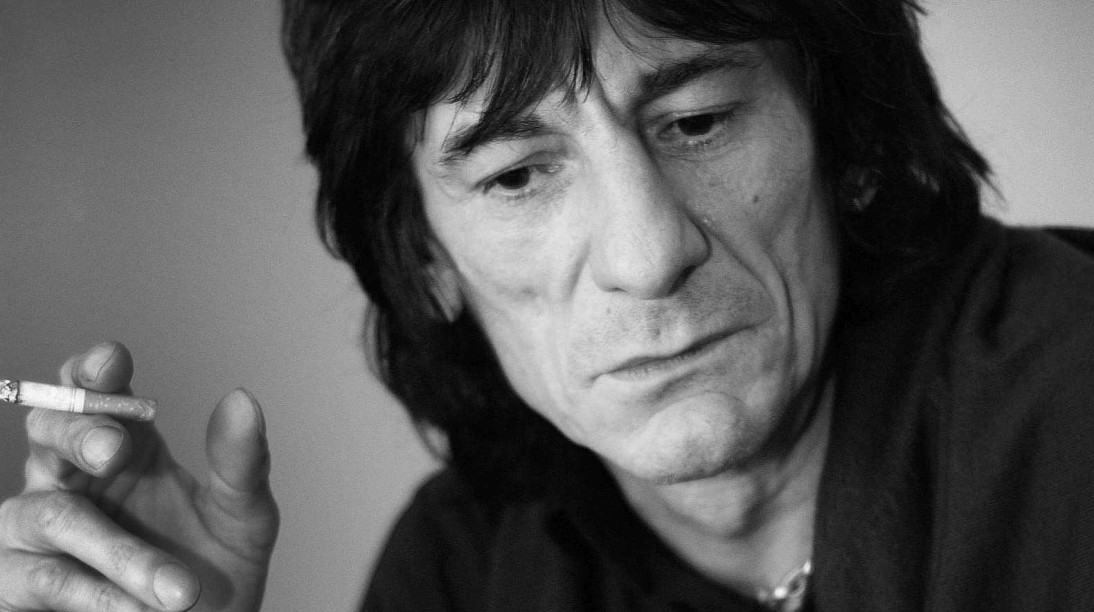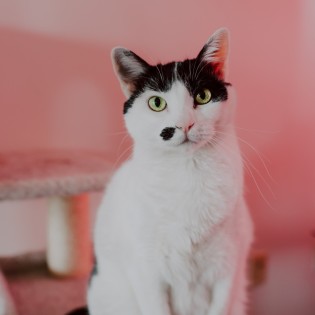Ron Wood on meringue

Booze and band rifts
Six months ago, reality hit Ronnie Wood. Or rather his Brazilian girlfriend Ana Araujo did. She’d spotted him returning to his old boozing ways and was having none of it, thumping him and disposing of every liquid temptation within his reach.
“She poured the last bottle away right in front of my eyes. I was going, ‘How could you do that?’ But something at the back of my mind was saying, she’s doing the right thing.”
It was a turning point. “I’ve poured drink away before and I always knew I’d have another one. When the last bottle went, it was the end of an era. Something clicked in me.” Now, where once it was vodka, it’s “coffee and different kinds of water, different colours of juice”.
I’m talking to Ronnie in his pristine art studio in a gentrifying quarter of east London. The white walls of the tall building are covered in his paintings: horses, his house in Ireland and rock stars, particularly his band the Rolling Stones. Others sit on easels on varnished pine floorboards. Among them are canvasses of Ana, the 30-year-old polo coach he met early this year.
When I arrive early at Ronnie’s place, he’s still out. Sherry Daly, his manager, is checking his catering arrangements. Much as you’d expect a rock manager to scrutinise royalty accounts, contracts and tour dates, examining his food looks like admirable attention to detail. Just as well, as it goes, because a questionable cake is lurking in the fridge.
Sherry swiftly dispatches the iffy gateau into the bin. I imagine the same fate awaits me if I stray too much into Ronnie’s personal life, especially his divorce from Jo, his wife of 25 years (the decree nisi is through but the final, decree absolute is awaited). To be sure, Sherry sits in on the interview.
After a five-minute discussion about English marital law and baking products, Ronnie breezes in, wearing a bottom-skimming Topman dogtooth check suit. It’s a Mod-like style he might have effected in the mid-1960s. Few blokes his age – 63 – could get into it, let alone carry it off.
To say that Wood is wiry is to make a 240-volt mains cable look chubby. Indeed, men over 30 reading this may wish to skip this sentence: Wood still sports the 28-inch waist he had 40 years ago.
His approach to any hint of a bulging belly is simple. “When I start to get a gut, I have a word with my stomach and say, ‘This can’t happen. You’ve got to go down.’ And sure enough, it goes down.”
Any other health tips? “I don’t eat a hell a lot of meat because it takes your body a while to digest. I run a bit. I do my tai chi. I’ve got 140 stairs here. I went up and down three times. Then I had to lay down. The room was spinning round and I was short of breath. At least I did it.”
Ronnie looks pretty good, despite those jokes about the Rolling Stones and their wrinkles. The jazz singer George Melly once cruelly remarked, upon hearing the argument that Mick Jagger had laughter lines: “Surely nothing could be that funny?” Ronnie has a similar patina, but his deep, dark brown eyes have a vitality that belies the alcohol and pharmaceuticals he has ingested over his half century in music, and the accompanying stints in rehab.
If the suit betokens Ronnie’s past life flashing before him, so does a musical event. The Faces, the group he helped found in 1969, are back together.
Why Rod's not joining them
Ronnie first met Rod Stewart, the man who would eventually supply those vocals, in 1965, when he spotted him in a Soho pub wearing a Coco The Clown jacket. Stewart has conspicuously not joined them for the reunion dates so far. Instead, Mick Hucknall has been recruited as frontman, joining original keyboardist Ian McLagan and drummer Kenney Jones.
Wood is nevertheless magnanimous about Rod, congratulating him on impending birth of his second child with his wife Penny Lancaster and parrying any suggestion of frostiness between the two. “If he was to walk in now, it would be like nothing had changed. I had dinner at his house in Los Angeles recently and he was a great host.”
If Ronnie is reliving his youth, then a recent discovery can only have added to that feeling. Diane Wood, widow of his late brother Ted, was rifling through an attic when she found a pair of Ronnie’s diaries. There was one from 1963 and a more extensive one from 1965, when Wood was 18 and touring with an R&B band called the Birds (no relation to the US outfit the Byrds).
“It’s leather-bound with gold edges and looks like it ought to be Dickens. Every year in that period, I would keep a note of everything that went on. Reading it was quite an eye-opener. I didn’t realise how much I was into the book-keeping. I’d record all the expenses we ran up in the margin, not that it helped with the sharks you used to get as managers in those days.
“I wish I’d gone into more detail. It was crazy in those days but also lonely when you were touring up north and didn’t know anyone. Sometimes we didn’t play well and the audience didn’t like us. Then we’d go back to a dingy hotel room with hardboard walls where it was freezing and feel awful. Next night, you’d have a mad audience who wanted to tear your hair out.”
The band were big in Salisbury and Chester, where girls would write on their van in lipstick. The group played pranks on each other to relieve the boredom, on one occasion hiding in Ronnie’s hotel wardrobe while he explained the finer points of the flattened third chord to a female fan (or something like that). What they found surprising was that Wood was naked apart from his red socks – an old English habit, he reckons, that he only kicked later in his romantic career.
Ronnie, you imagine, didn’t get angry, but laughed it off. It is this affability on the road, coupled with an agreeable cheer, that has probably kept him in work for the past 50 years. Certainly, when Mick Taylor left the Rolling Stones in 1974, the band considered American replacements, but they needed someone with an English sense of humour. Ronnie, the Stone you’d most want to share a long train journey with, got the job.
About those bust-ups
Life on the road with the Stones, however, hasn’t always been sweetness, light and games of I-Spy. The group are notorious for their bust-ups
There was talk recently of a rift between Wood, on one side, and Jagger and Richards on the other. The pair had grown tired of Ronnie’s boozing, it was said, and didn’t want him on tour.
Wood is pragmatic. “Not having contact for a while, things get a little distorted, but once you sit down with, say, Mick, that all goes out the window. All the ‘You said this about me’ and ‘I think you’re rotten’ evaporates as soon as we’re in the same room.”
Will the Stones go on forever? “Yeah, just like John Lee Hooker, Muddy Waters and Howlin’ Wolf did. It’s in our blood. We couldn’t stop even if we wanted to.”
The logistics of big tours are nonetheless wearing. “We can’t wait to get on stage for a bit of peace and quiet – all the mayhem that goes on all around just disappears. We do have a laugh, once we get together in the rehearsal studio or on stage. You know, we really should do it more often.”
One reason for the Stones’ longevity is that they have surrounded themselves with steely women, no one more so than Jo Wood. Over these past two years, the couple have striven to keep their split free from rancour, with 54-year-old Jo saying: “We are friends. He’s my children’s father and I don’t want them to hate him. He’s a good man and I’m glad I don’t have to deal with the problems any more.”
Jo convinced Wood when she first met him that she worked on the broken-biscuit counter of Woolworth in Oxford Street (they used to sell them by the pound in those days). In fact, she was model, her droopy pout and Goldie Hawn looks enough to make her the Sun newspaper’s Face Of 1972.
She didn’t much care for drugs when they first met, even if she later got him out of trouble by hiding cocaine in their children’s water wings during a police raid on their Caribbean holiday home.
The Woods’ life together was littered with parties, many of them at Holmwood House, the 19,000 square feet hunting lodge they bought in Kingston, Surrey, in 1997. Earlier this year, Jo put the pile on the market at £13 million and it is now under offer. Again she is unfussed, remarking: “That house needs a big family with lots of kids running around. I don’t use most of it.”
Drawings of Jo in Ronnie’s memoirs leave little doubt why he was attracted to her. He has always sketched people around him, but his output has ramped up over the past decade, culminating in a forthcoming exhibition at the Butler Institute Of American Art in Youngstown, Ohio, the first time he has shown at a big US gallery.
Damien Hirst made me a painter
Intriguingly, it was Damien Hirst who encouraged Wood to spend more time painting, partly to keep him from drinking.
“He reintroduced me to the idea of having loads of materials at my disposal. I always kept my hand in, but never had a huge stockpile of paints, brushes, cleaning materials, easels and canvas. When I came out of rehab two or three years ago, Damien said, ‘I’ve rented you a flat in Belsize Park. You’re paying for it, but I‘ve laid on enough art materials to start an art school.’ Every little thing he thought of. He said: ‘You’ve got no excuse now.’ ”
One of the first things Wood did was a vivid red and ochre piece called I Feel Like Painting, later used as a print for a collection sold at the Liberty store and which is rendered in a different form for the new album cover. “When Damien came in to check I was working, he said, ‘I like that.’ He saw me slip off the wagon a few times and I think he lost a bit of faith in me, but now he’s regained it because he’s seen that I’ve had some good clean times, six months, behind me.”
Wood has clearly spent a lot of time pondering the relationship between artistic inspiration and intoxication. It was an arc of destructiveness that led to his using freebase cocaine, made by employing baking soda or ether to free the cocaine base, which is then smoked. In the early 1980s, Ronnie was so obsessed with the substance that he banned his children from eating meringues in his Californian house. He’d sometimes mistaken the confectionary crumbs on his carpet for freebase cocaine crystals and tried smoking them.
Wood wishes he could have told the likes of Amy Winehouse just to say No, but knows he can’t. “In the early days, drugs and alcohol went towards creating the music, the atmosphere and the image of a band. Years ago, I would have a few drinks and come up with these brilliant ideas and follow it up with a few lines of coke. Back then, it used to work. Now it doesn’t work. I’m really pleased it doesn’t work any more because it just was a downward spiral.”
Here his chirpy, articulate delivery falters and the words are punctuated by small silences. Wood, who doesn’t think recreational drugs should be legalised, accepts that teenagers will be offered drugs.
“If you tell them they’re not allowed it, they’re going to do it anyway. Have an open mind. OK, you’ve tried it but what were the real advantages? They’ll see it was short-lived. I don’t think they realise how near death they are if they go over the top.
“I survived because I had a built-in sense that I had to stop. Everyone else was taking more, but I thought, ‘No, hang on, I’ve had enough.’ With alcohol, though, I used to just keep on and on. Then I’d drink through it until I was more or less sobered up and then started up again. I used to drink my wine cellar clean. If anyone came round, it was an excuse to get the finest bottle out. But I was just kidding myself. In the end I had to face up to the consequences, to people not trusting me, losing faith in me.”
Wood says he comes from a long line of alcoholics. His family were operators of commercial barges, what he calls ‘water gypsies’. His mum Lizzie and dad Arthur were born on boats in the Paddington Basin in West London.
I blame the parents
“My mum used to have a lot of control and didn’t start drinking at home until late. She never opened what she called her ‘pub’ until 10 at night. That was constrained. OK, so she might have a Guinness in the afternoon, but that was all. I could never do that. I used to drink eight pints, go on to a bottle of vodka and then another bottle.”
As we get older we come to resemble our parents, I suggest. “Yeah. It’s horrific to think I’m like my dad. No matter what was required of him, he would let nothing stand in the way of his drinking. Nothing. It didn’t matter if someone was ill or my mum pleaded with him not to go out, he would never listen.”
All the same, Ronnie remembers his parents with affection. They’re both now gone, as are his elder brothers Art and Ted. “I’ve lost a lot of people close to me. I’ve no one to show off to. My dad used to be very proud of me, if I’d won an award. He used to call me Ronnie Wood Of The Rolling Stones.”
Despite the lack of parental and fraternal plaudits to encourage him, Wood shows little sign of slowing down. He remains the hyperactive child whose mother once tethered him to the kitchen table to stop him rolling down the back steps. “Even when I’m in bed, I’ve got these ideas going. I can’t turn my brain off. I must do this. Lyrics come to me. Then appointments.”
He’s interested in being a novelist (his memoirs were published in 2007). “I’d like to write fiction but based round real events, something to do with music.” He also wants to do more ballet paintings.
It is this restlessness that has made him a survivor. Any suggestion that touring and playing gets harder and requires more preparation as age catches up with him is robustly rejected. “I remember Pete Townshend saying: ‘Don’t try to grow old gracefully; it wouldn’t suit you.’ ”
First published in The Times in 2010





